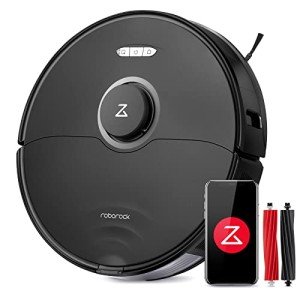Tips For Explaining Robotic Vacuum To Your Mom
The Rise of the Robotic Vacuum Cleaner: Revolutionizing Home Cleaning
In the realm of household devices, robotic vacuum cleaner s have actually emerged as one of the most substantial innovations over the last few years. These autonomous devices offer convenience and effectiveness, allowing property owners to maintain cleaner living areas without the drudgery of manual vacuuming. This short article explores the evolution, functionality, advantages, and considerations regarding robotic vacuum, along with providing insights through data tables and regularly asked concerns.
A Brief History of Robotic Vacuum Cleaners
The journey of robotic vacuum started in the late 20th century, with early models stopping working to make substantial strides in homes. Nevertheless, improvements in innovation caused the intro of more refined designs in the early 2000s. Companies such as iRobot and Neato played an essential function in popularizing these wise home gadgets.
Evolution Timeline of Robotic Vacuum Cleaners
Year
Turning point
1996
Introduce of the first robotic vacuum, the ELECTROLUX TRINITY
2002
iRobot presents the Roomba, an extensively recognized design
2012
Intro of designs with advanced mapping abilities
2020
Incorporation of synthetic intelligence for improved navigation
2023
Designs with incorporated clever home connectivity and app control
How Robotic Vacuum Cleaners Work
Robotic vacuum cleaners utilize a mix of sensing units, mapping innovation, and expert system to navigate and clean different surface areas efficiently. Here's a streamlined overview of their core functionality:
Sensors: Equipped with infrared or ultrasonic sensors, these devices can detect barriers, cliffs, and dirt, allowing them to browse through spaces without crashing into furniture or toppling down stairs.
Navigation: Most modern-day robotic vacuum cleaners integrate wise mapping technologies, allowing them to map out the home design and optimize cleaning courses.
Cleaning Mechanism: Using brushes and suction power, robotic vacuums gather dirt, dust, and debris from numerous floor types, consisting of carpets and wood.
Charging and Cleaning Schedules: After finishing a cleaning session or when their battery runs low, these robotics immediately go back to their charging dock. Users can set cleaning schedules by means of smart device apps, helping keep a tidy home effortlessly.
Advantages of Robotic Vacuum Cleaners
Robotic vacuum cleaners use various benefits over conventional vacuuming methods. Here are some of the key advantages:
- Time-Saving: Automated cleaning indicates property owners can designate their time to other activities.
- Convenience: Scheduling cleaning sessions enables a tidy home without manual intervention.
- Thorough Cleaning: Many robotic designs come with specialized brushes to tackle family pet hair and offer deep cleaning on carpets and rugs.
- Smart Home Integration: Many systems work with wise home systems, offering voice control and remote management.
Popular Features in Robotic Vacuum Cleaners
Function
Description
Mapping Technology
Creates a digital map of the cleaning location
Mobile App Control
Offers users the capability to start/stop or schedule cleaning sessions remotely
Self-Cleaning
Some designs have docking stations that can self-empty dust bins
Advanced Sensors
Detects dirt more efficiently and browses better
Voice Control
Compatible with virtual assistants like Alexa and Google Assistant
Considerations Before Purchasing a Robotic Vacuum Cleaner
While robotic vacuum use many advantages, potential buyers need to think about a couple of elements before making a purchase. Here are some points to bear in mind:
Key Factors to Evaluate
Floor Type: Certain models perform much better on carpets while others stand out on hard floors. Purchasers must pick versatile vacuums if they have actually blended floor covering.
Battery Life: Longer battery life enables extended cleaning sessions. Search for models that can cover large locations without regular charging.
Dustbin Capacity: A bigger dustbin decreases the frequency of emptying, making cleaning less labor-intensive.
Noise Level: Some models run quietly, which is best for homes with children or delicate pets.
Maintenance: Users need to also examine the ease of upkeep, especially for filters and brushes.
Potential Drawbacks
- Price: Robotic vacuum cleaners can be significantly more expensive than conventional vacuums.
- Efficiency: While they efficiently preserve tidiness, they may not always match the deep cleaning effectiveness of manual vacuums.
- Challenge Navigation: Some designs may battle with particular kinds of furniture or cluttered areas, possibly resulting in missed areas.
FAQs About Robotic Vacuum Cleaners
Q1: How often should I run my robotic vacuum cleaner?
A1: It usually depends upon your family. For homes with animals or high foot traffic, running it day-to-day is helpful. In less active homes, you might discover every other day is adequate.
Q2: Can robotic vacuum deal with carpets?
A2: Most robotic vacuums can clean up carpets; however, features such as suction power and brush design can significantly affect their efficiency on different carpet types.
Q3: Are robotic vacuum cleaners great for family pet hair?
A3: Yes, many models are specifically created to get pet hair and come with specialized brushes to prevent tangling.
Q4: What happens when the vacuum lacks battery?
A4: Most robotic vacuums instantly return to their charging dock when their battery is low, ensuring they are ready for the next cleaning session.
Q5: Can I control my robotic vacuum with my smartphone?
A5: Yes, numerous robotic vacuum cleaners come geared up with mobile apps that enable you to set up cleansings, display development, and get alerts.
Robotic vacuum cleaners represent a significant advancement in home-cleaning technology, merging benefit with performance to basically change how families keep cleanliness. As best robot vacuum cleaner UK continue to emerge, these devices are becoming increasingly capable, offering users not only time-saving options but also enhanced cleaning experiences. As the marketplace continues to grow, prospective buyers are encouraged to weigh the features, benefits, and factors to consider carefully to discover the best design tailored to their special requirements. Whether it's a hectic family, a pet fan, or someone seeking automation in their cleaning regimen, there's likely a robotic vacuum that fits the expense.
